Positive psychology practices can significantly enhance well-being and life satisfaction. Key practices include gratitude journaling, mindfulness meditation, and acts of kindness. These methods foster resilience, improve emotional regulation, and promote meaningful connections. Research indicates that consistently applying these techniques leads to better mental health outcomes and increased happiness.
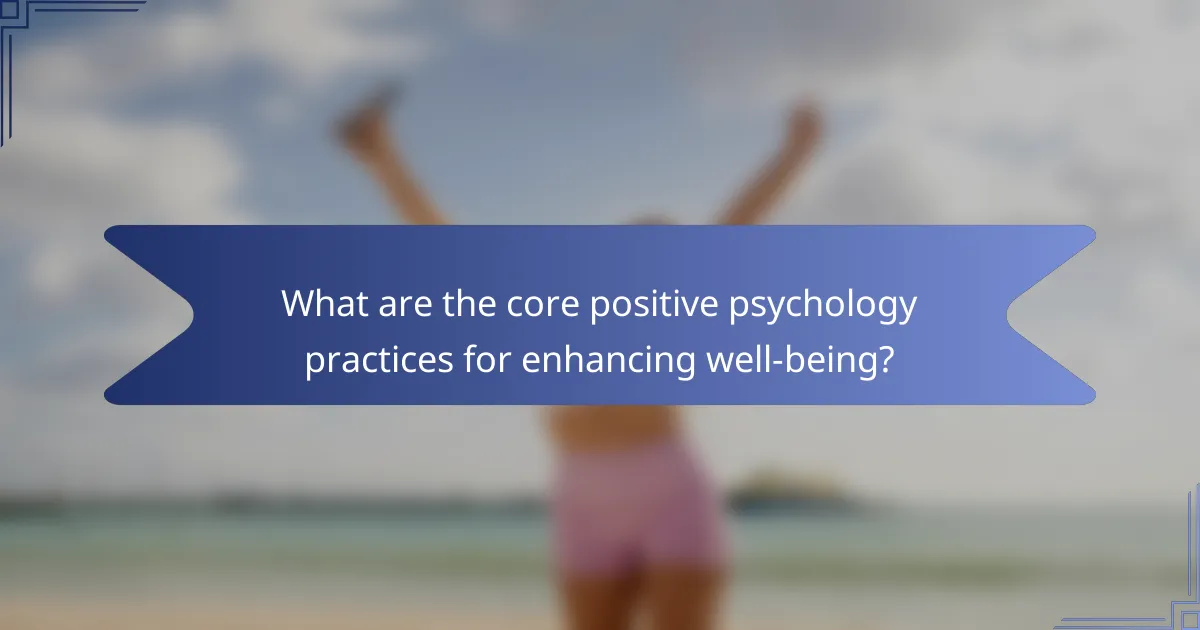
What are the core positive psychology practices for enhancing well-being?
Positive psychology practices significantly enhance well-being and life satisfaction. Key practices include gratitude journaling, mindfulness meditation, and engaging in acts of kindness.
Gratitude journaling encourages individuals to reflect on positive experiences, fostering a sense of appreciation and fulfillment. Mindfulness meditation promotes present-moment awareness, reducing stress and enhancing emotional regulation. Acts of kindness not only benefit others but also boost the giver’s happiness and sense of connection.
Research shows that consistently applying these practices can lead to improved mental health and increased life satisfaction. For instance, individuals who regularly express gratitude report higher levels of happiness and lower levels of depression.
Incorporating these practices into daily routines can create a profound impact on overall well-being, making them essential tools for personal development.
How do positive emotions contribute to life satisfaction?
Positive emotions significantly enhance life satisfaction by fostering resilience and promoting a positive outlook. They contribute to improved mental health, stronger relationships, and increased motivation. Research indicates that individuals who regularly experience positive emotions report higher levels of overall life satisfaction. Engaging in activities that cultivate joy, gratitude, and optimism can lead to lasting improvements in well-being.
What role does gratitude play in positive psychology?
Gratitude plays a crucial role in positive psychology by enhancing well-being and life satisfaction. It fosters positive emotions, strengthens relationships, and promotes resilience. Research indicates that practicing gratitude can lead to improved mental health, including reduced symptoms of depression and anxiety. Regular expressions of gratitude, such as journaling or thanking others, can increase overall life satisfaction. This unique attribute of gratitude makes it a powerful tool in cultivating a positive mindset and improving quality of life.
How can strengths-based approaches improve personal fulfillment?
Strengths-based approaches enhance personal fulfillment by focusing on individual strengths rather than weaknesses. This method promotes self-awareness, boosts confidence, and fosters a sense of purpose. Research indicates that leveraging personal strengths can lead to increased life satisfaction and overall well-being. By identifying and cultivating these strengths, individuals experience greater engagement and fulfillment in their daily lives.
What is the significance of resilience in well-being?
Resilience significantly enhances well-being by enabling individuals to cope with stress and adversity. It fosters emotional stability, promotes positive relationships, and encourages adaptive coping strategies. Resilient individuals often exhibit a unique attribute: the ability to maintain a hopeful outlook, which contributes to greater life satisfaction. Studies indicate that resilience is linked to lower levels of anxiety and depression, reinforcing its importance in positive psychology practices. Cultivating resilience through mindfulness, social support, and goal-setting can lead to improved mental health outcomes.
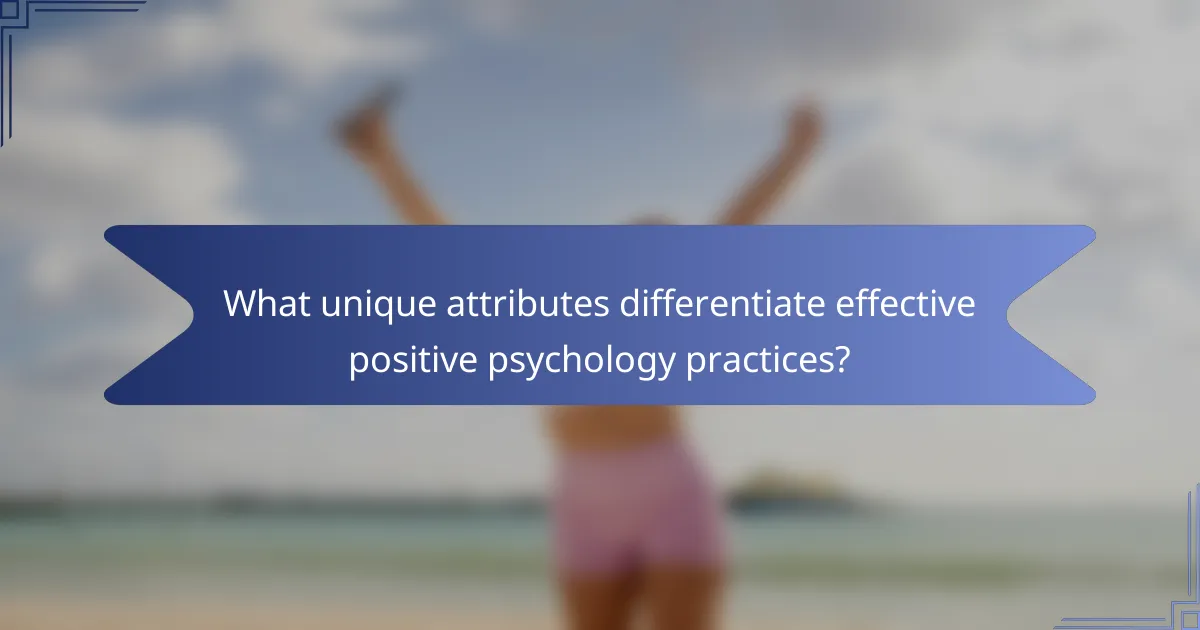
What unique attributes differentiate effective positive psychology practices?
Effective positive psychology practices stand out through their focus on individual strengths, fostering resilience, and promoting meaningful connections. These unique attributes include tailored interventions that adapt to personal circumstances, which enhance engagement and motivation. Additionally, evidence-based techniques, such as gratitude exercises, contribute to sustained well-being. Finally, the integration of mindfulness practices uniquely differentiates these methods, leading to improved emotional regulation and life satisfaction.
How can tailored interventions enhance individual happiness?
Tailored interventions can significantly enhance individual happiness by addressing unique needs and preferences. Personalized approaches, such as goal setting and strengths identification, foster engagement and motivation. Research indicates that individuals who participate in customized positive psychology practices report higher levels of life satisfaction. For example, interventions focusing on gratitude or mindfulness can lead to substantial improvements in emotional well-being. These methods not only support personal growth but also build resilience, leading to lasting happiness.
What unique practices are culturally relevant in positive psychology?
Positive psychology incorporates unique practices that enhance well-being across cultures. These practices include gratitude rituals, mindfulness meditation, and community engagement.
Gratitude rituals, such as keeping a gratitude journal, promote positive emotions and life satisfaction. Mindfulness meditation fosters present-moment awareness, reducing stress and improving mental clarity. Community engagement through volunteering strengthens social connections, contributing to a sense of purpose and belonging.
These practices vary culturally but share a common goal of enhancing individual and collective well-being. Embracing these culturally relevant practices can lead to improved mental health and overall life satisfaction.
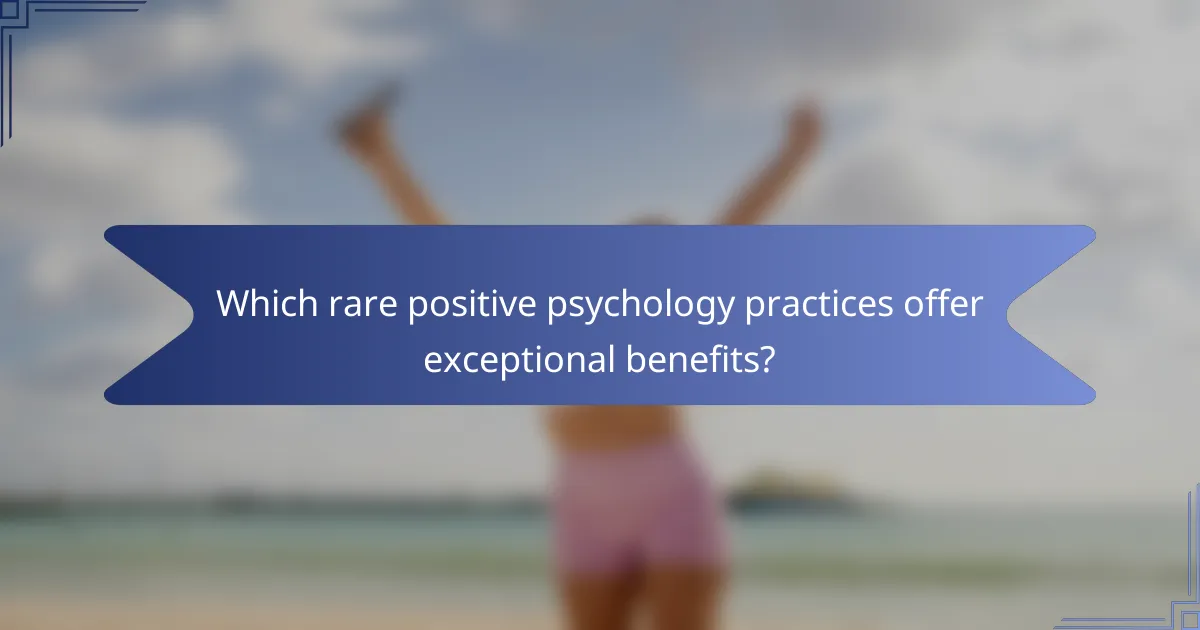
Which rare positive psychology practices offer exceptional benefits?
Practices like gratitude journaling, mindfulness meditation, and acts of kindness yield exceptional benefits in positive psychology. These rare practices enhance well-being, foster resilience, and increase life satisfaction. Gratitude journaling encourages reflection on positive experiences, promoting a positive mindset. Mindfulness meditation improves emotional regulation and reduces stress, leading to greater overall happiness. Acts of kindness create social connections, boosting feelings of belonging and purpose. Embracing these practices can significantly transform one’s outlook on life.
What are the uncommon strategies for fostering hope and optimism?
Uncommon strategies for fostering hope and optimism include engaging in creative expression, practicing gratitude journaling, and utilizing visualization techniques. These practices enhance emotional resilience and promote a positive mindset.
Creative expression through art or writing allows individuals to explore their feelings and envision future possibilities. Gratitude journaling encourages reflection on positive experiences, reinforcing a sense of appreciation and hope. Visualization techniques, such as imagining desired outcomes, help individuals focus on achievable goals, fostering optimism about the future.
Incorporating these practices into daily routines can significantly enhance overall well-being and life satisfaction.
How can creative expression serve as a rare tool for well-being?
Creative expression is a rare tool for well-being as it fosters emotional release and personal insight. Engaging in creative activities like painting, writing, or music can enhance life satisfaction by promoting mindfulness and self-discovery. Studies show that individuals who regularly practice creative expression report lower levels of stress and higher overall happiness. This unique attribute of creativity serves as a powerful mechanism for individuals to process emotions and experiences, ultimately contributing to improved mental health.
What innovative approaches are emerging in positive psychology?
Innovative approaches in positive psychology focus on enhancing well-being through practices like mindfulness, strengths-based interventions, and positive relationships. Emerging trends include digital mental health tools, community-based programs, and integrative wellness models. These practices leverage technology and social support to foster resilience and life satisfaction. For example, apps that promote gratitude and self-reflection are gaining popularity, providing accessible resources for personal growth.
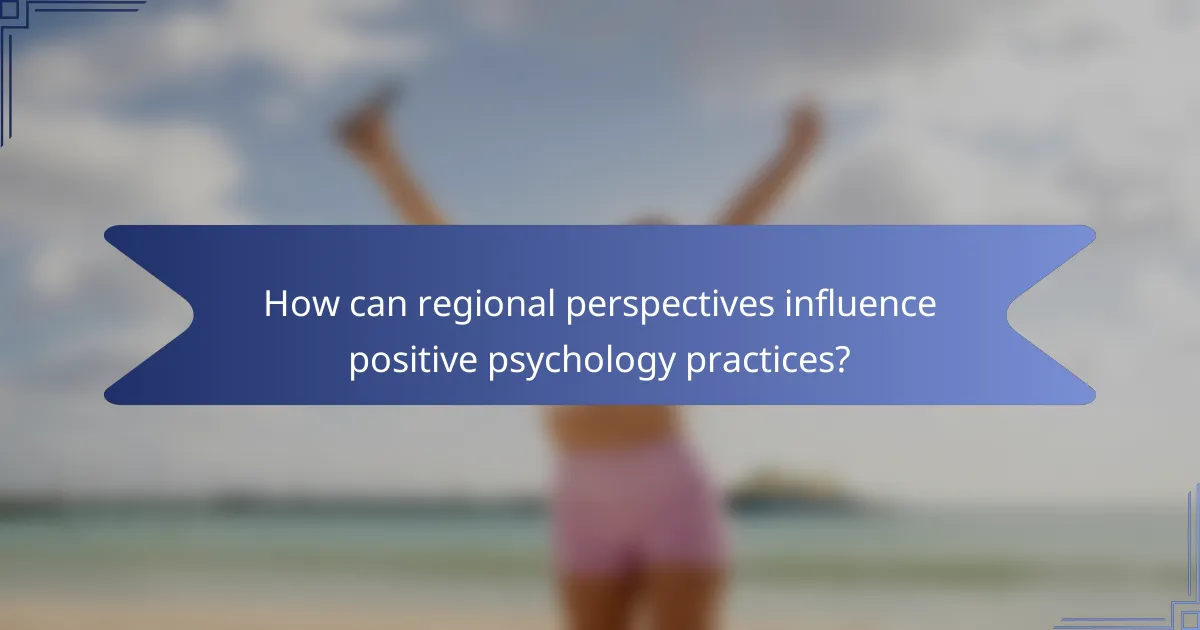
How can regional perspectives influence positive psychology practices?
Regional perspectives significantly shape positive psychology practices by integrating cultural values and beliefs into well-being strategies. These practices often reflect local traditions, enhancing their relevance and effectiveness. For instance, collectivist cultures may emphasize community support, while individualistic societies might focus on personal achievement. This alignment fosters greater acceptance and participation in positive psychology interventions, leading to improved life satisfaction. Moreover, unique attributes such as local rituals or community events can enhance the practice’s impact, making them more relatable and engaging. Understanding these regional nuances is essential for tailoring positive psychology approaches to diverse populations.
What local traditions enhance positive psychological interventions?
Local traditions significantly enhance positive psychological interventions by fostering community bonds and cultural identity. Practices such as storytelling, communal celebrations, and rituals promote social connections, which are essential for well-being. For example, the tradition of sharing meals strengthens relationships and provides emotional support. These interactions can reduce feelings of loneliness and increase life satisfaction. Unique attributes of local traditions, such as specific cultural rituals, contribute to this psychological enhancement by creating a sense of belonging and shared purpose.
How do cultural differences shape perceptions of well-being?
Cultural differences significantly influence perceptions of well-being. Different cultures prioritize various aspects of life satisfaction, leading to distinct positive psychology practices.
For instance, collectivist cultures often emphasize community and relationships, while individualistic cultures may focus on personal achievements and self-actualization. This variance shapes practices such as gratitude exercises, mindfulness, and social support systems, which are tailored to align with cultural values.
Research indicates that understanding these cultural nuances enhances the effectiveness of well-being initiatives. By integrating culturally relevant practices, individuals can achieve higher life satisfaction and a more profound sense of well-being.
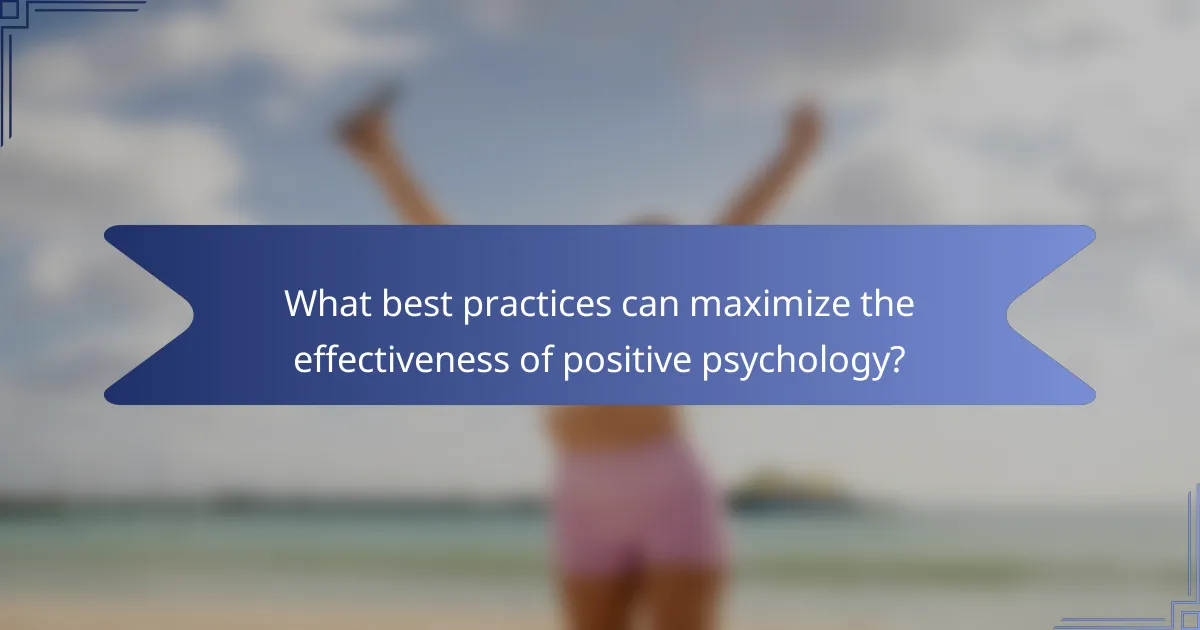
What best practices can maximize the effectiveness of positive psychology?
To maximize the effectiveness of positive psychology, individuals should incorporate practices that foster gratitude, mindfulness, and resilience. Engaging in daily gratitude exercises can enhance overall happiness by shifting focus to positive experiences. Mindfulness practices, such as meditation, promote awareness and reduce stress, contributing to improved emotional well-being. Additionally, building resilience through challenges enhances the ability to cope with adversity, leading to greater life satisfaction. Regularly applying these practices can significantly improve mental health and life quality.
What common mistakes should be avoided in implementing positive psychology?
Implementing positive psychology can lead to meaningful improvements in well-being, but common mistakes can hinder progress. Avoid focusing solely on positive emotions; balance is essential. Neglecting individual differences in experiences and needs can also limit effectiveness. Failing to integrate practices into daily life results in superficial engagement. Lastly, overlooking the importance of evidence-based approaches can diminish the impact of interventions.
How can individuals apply positive psychology techniques in daily life?
Individuals can apply positive psychology techniques daily by practicing gratitude, mindfulness, and strengths identification. These techniques enhance well-being and life satisfaction.
Gratitude exercises, such as maintaining a gratitude journal, help individuals recognize and appreciate positive aspects of life. Mindfulness practices, like meditation or focused breathing, promote present-moment awareness and reduce stress. Identifying personal strengths encourages individuals to leverage their unique attributes for better life experiences.
Engaging in these practices consistently can lead to increased happiness and improved mental health outcomes. Research indicates that individuals who practice gratitude regularly report higher levels of life satisfaction.
What steps can be taken to cultivate a positive mindset?
To cultivate a positive mindset, practice gratitude, engage in mindfulness, and foster social connections. These steps enhance well-being and life satisfaction.
1. **Practice Gratitude**: Regularly reflect on what you appreciate in life. This can shift focus from negativity to positivity.
2. **Engage in Mindfulness**: Incorporate mindfulness techniques such as meditation or deep breathing to reduce stress and increase awareness.
3. **Foster Social Connections**: Build and maintain supportive relationships to create a sense of belonging and improve emotional resilience.
4. **Set Goals**: Define clear, achievable goals to provide direction and purpose, enhancing motivation and satisfaction.
5. **Exercise Regularly**: Physical activity releases endorphins, which boost mood and contribute to a positive outlook.
6. **Limit Negative Influences**: Reduce exposure to negative media and toxic relationships that can drain positivity.
How can goal-setting enhance life satisfaction?
Setting goals enhances life satisfaction by providing direction and purpose. Clear goals motivate individuals, helping them to focus their efforts and measure progress. Research indicates that people who set specific and challenging goals report higher levels of happiness and fulfillment. Additionally, achieving these goals fosters a sense of accomplishment, reinforcing positive self-esteem and encouraging further goal-setting.
What daily habits support ongoing well-being improvement?
Daily habits that enhance well-being include practicing gratitude, engaging in regular physical activity, and fostering strong social connections. These practices contribute to improved life satisfaction and emotional resilience. For example, keeping a gratitude journal can increase positive emotions and overall happiness. Engaging in physical exercise releases endorphins, which boost mood and reduce stress. Additionally, nurturing relationships provides emotional support and a sense of belonging, essential for mental health. Implementing these habits consistently can lead to significant improvements in well-being over time.